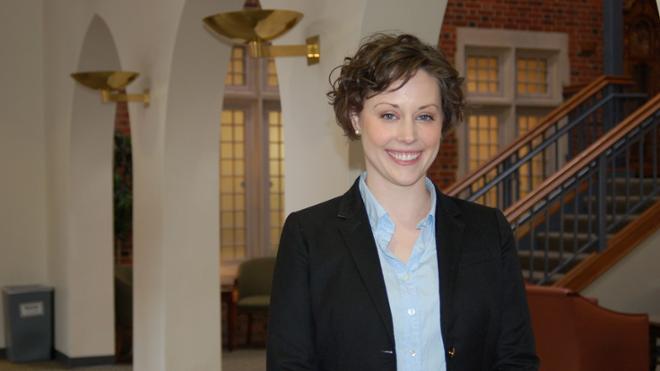Kathleen Dwyer, L'14
Earlier this month, Kathleen Dwyer, L'14, stood before a panel of judges in the Virginia Court of Appeals and delivered an oral argument on behalf of her client, a Richmond woman who was convicted of robbery and first-degree murder and is serving a thirty-five-year prison sentence. Equipped with a third-year practice certificate, Dwyer was able to represent a client in court through her participation in the University of Richmond School of Law's Pro Bono Criminal Appeals Program.
The Criminal Appeals Program is one of thirteen pro bono programs offered by the law school's Harry L. Carrico Center for Pro Bono Service. In addition to providing students with a service-based legal education, the center is also an important legal resource for Richmond's under-privileged population. Under the supervision of local attorneys and law school faculty, students have the opportunity to work on criminal appellate cases from the initial petition stage through the merit phase of the appeal.
Dwyer said her interest in criminal law prompted her to apply to the Pro Bono Criminal Appeals Program during the fall semester of her second year of law school. Her work has focused on one case for which she conducted client interviews, researched the legal issues, and prepared a petition for appeal. In January, Dwyer argued the merits of the case before the Court of Appeals of Virginia.
Dwyer was paired with Cullen Seltzer, L'93, an attorney at Sands Anderson's Richmond office. Seltzer is a member of the law school's adjunct faculty, currently teaching Ethics and Criminal Law. Seltzer has supervised Dwyer throughout the appeals process. She said, "Cullen has been an amazing supervisor and mentor. He's really given me the reins on this appeal—it's my writing, it's my argument."
Tara Louise Casey, director of the Harry L. Carrico Center for Pro Bono Service, said she's grateful for the support of the pro bono attorneys participating in the Criminal Appeals Program. She explained, "The success of this program relies upon the time and talents of our area's criminal defense bar, who have taken these cases pro bono and volunteered to mentor and supervise students through the life of the appeal."
Casey added, "Their mentorship, guidance, and encouragement of our students has been tremendous. This program remains one of our most popular, due in large part to the direct one-on-one relationship with practitioners in the community and the hands-on experience it provides."
Three years ago, Dwyer's client was convicted of robbery and first-degree murder and sentenced to 35 years in prison. Although her client wasn't involved in any acts of violence, she was convicted of murder because of her alleged participation in the robbery with her estranged son, even though he, undisputedly, was the person who killed two victims.
"Because she was allegedly working with her son in the unlawful act of robbery, the Commonwealth argued she was criminally liable for the probable and incidental consequence of the robbery," Dwyer explained. Virginia law holds that aiders and abettors can be convicted of the same crime as the principle committing murder.
The court originally denied her client's petition for appeal, so Seltzer and Dwyer requested an oral argument before a writ panel. The panel granted a writ on one of the issues that they argued: the denial of a jury instruction defining the intent to steal. Dwyer's client said she was ordered by her son to place the victim's property in a bag, and she cooperated in order to save her life. However, her client testified she did not intend to "permanently deprive the owner of his or her property," a distinction that was not defined during her trial.
Dwyer argued that without this jury instruction, the jury was not properly informed of the legal principles of intent to steal. Dwyer said the entire case hinged on the precise legal definition of robbery's intent to steal and that it was an unfair trial without it.
Dwyer said making the argument in court was nerve wracking, but she was really glad to have the experience. If the court is persuaded by Dwyer's argument, her client's case could be reversed, allowing her to have a second trial with the jury instruction included, or her sentence could be shortened. Dwyer stressed the importance of such a decision. "This is her life at stake."
"I was fortunate to have the time and resources to put my full self into it and give her zealous representation." Dwyer said participating in the appeals program was a great learning experience. She explained, "I could tell you everything about concert of action and robbery's intent to steal because I spent so much time diving into the minute details of those legal principles. That's really worthwhile information."
Dwyer said participating in the Criminal Appeals Program was also a great opportunity to meet people and network. After she graduates this spring, Dwyer is interested in working in a public defender's office and becoming certified to act as a guardian ad litem. She's also interested in handling criminal appeals on a pro bono basis in the future.
Dwyer said having the third-year practice certificate was extremely important and helped her to prepare for real-world legal practice. She also used the certificate while working at the Richmond Commonwealth's Attorney's office last summer and as a member of the School of Law's Children's Defense Clinic. She added, "Without the third-year practice certificate, I wouldn't have been able to do any of this."
